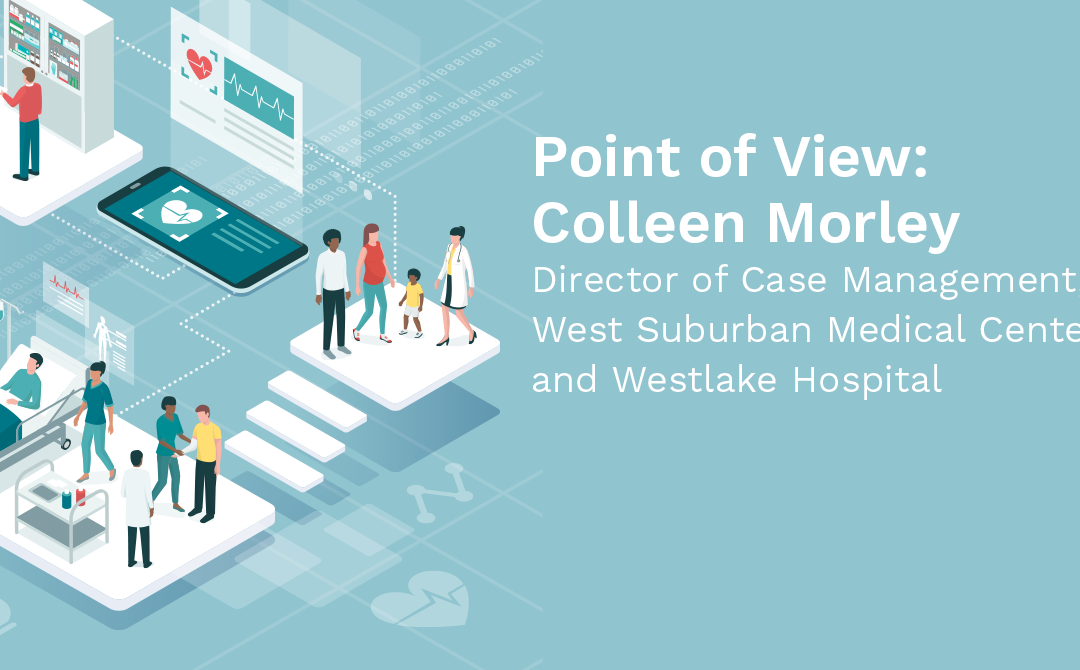
Colleen Morley on backing her team, coaching family caregivers, treating social determinants, and increasing patient education.
Case managers are often referred to as patient advocates. Colleen Morley is a self-described “advocate of the advocates.” She is the director of case management for West Suburban Medical Center and Westlake Hospital, both in the Chicago suburbs. Part of her role, she says, is to ensure that case managers are recognized as an integral part of the care team.
“It’s a very fine line to balance medical necessity and safe discharges with the hospital’s revenue cycle so the patient isn’t discharged too soon, doesn’t linger in the hospital unnecessarily and has what they need to be successful after discharge. How do you find that fine line? It comes with experience and it comes with working as a team with doctors and nurses on each and every patient.”
Morley also is the incoming president of the Chicago chapter of the Case Management Society of America. Here’s what else she had to say:
Coaching up family caregivers
When we get patients in the hospital who need post-acute care, we look at who’s in their contracted network through their insurance and then come up with a plan A, plan B, plan C, as many options as needed, so when they’re discharged it’s with the right resources. Where it starts to get sticky is with some managed care plans. The networks are getting more narrow and it’s not always easy for us to make that linkage. We’ll send out 50 or 60 referrals and get 50 or 60 denials. In those cases, when we cannot identify a post-acute provider, we look for a family member or caregiver who we can teach and train on things like wound care, managing medications or taking blood pressure. Sometimes, that’s the only option available but it’s our last resort.
Solving social determinants of health issues
Issues like homelessness, food insecurity or a lack of behavioral health resources get in the way of people taking care of their physical health. When patients are struggling, not only are they not compliant, they’re not even invested in their care. Behavioral issues can override everything else.
We’ve had CHF patients, for example, who need to be on a low-sodium diet but are shopping at the corner store, so they have a diet that consists of canned or frozen foods that are high in sodium. Or, they don’t have a place to live, so how are they going to eat healthy in the first place? But if you can take care of the other issues, then you have a running chance of taking care of the CHF.
Following the lead of community organizations
Addressing social determinants is resource-, labor- and revenue-intensive, and starting and running programs can be difficult if you try to do it on your own. And not just medical resources, but social and community support. It’s become important to partner with community organizations that are already in place, identify commonalities and how each can contribute to addressing the issue at hand.
Many local projects help solve some of these issues. The University of Illinois has a great project with the housing council that places veterans in long-term housing. West Suburban Hospital, where I’m at now, runs a medical food pantry and served 1,600 people last year. Cook County Hospital contracted a fleet of vehicles for free medical transportation. We’re seeing programs like these more than ever. It feels like a patchwork quilt of services sometimes, but that’s OK. It comes down to doing the right thing for the patients.
Offering more patient education
Some patients use the ER as their primary care provider. As a group, we need to get much better at changing the culture of what the ER is for and offering education on the appropriate course of action. A better option might be for patients to call their primary care physician and ask if they can be seen the same day. Some people just don’t know how to ask for that.
Embracing technology, waiting on interoperability
Moving forward, interoperability has got to be the key word. In Illinois, few hospitals have subscribed to the Health Information Exchange (an electronic network to facilitate the secure transmission of healthcare information between providers). When hospitals act as their own entities rather than a part of the healthcare community; they’re working in a silo. But when we can find all the patient information we need in one central repository, and when the interoperability hurdle has been solved, that’s the next step health literacy.
Hear more from Colleen Morley at the CMSA annual conference on June 11, where she will speak about reducing readmissions using patient perspective and social determinants of healthcare.




